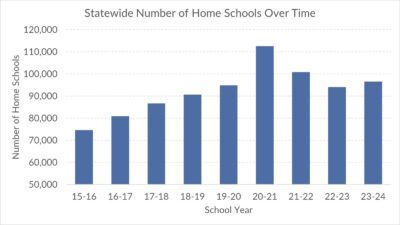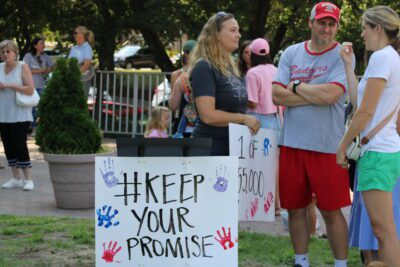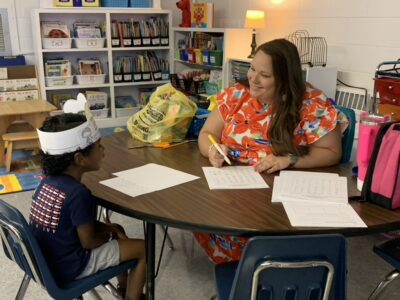|
|
The total number of private schools in North Carolina remained relatively stable during the 2023-24 school year, according to the annual report released by the Division of Non-Public Education (DNPE) in July 2024. The report estimates that there were 131,230 private school students in 2023-24 — up from 126,768 students the year prior, or an estimated 3.5% increase.
You can read the DNPE report here. The report includes private school numbers by county, type of school (religious or independent), and by sex.
The number of private schools statewide
During the 2023-24 school year, there were 881 total private schools in North Carolina — down from 884 in 2022-23, but up from 828 schools in 2021-22.
According to the report, religious schools make up approximately 65% of private schools in the state, with independent schools making up the other 35%.
While the number of independent private schools decreased last school year (from 319 to 308), the number of religious schools increased (from 565 to 573).
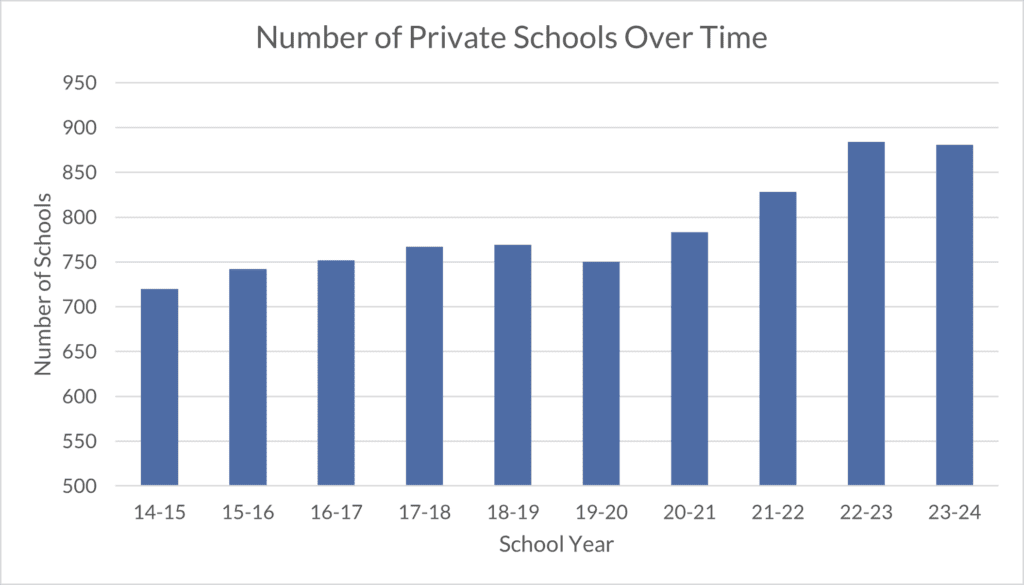
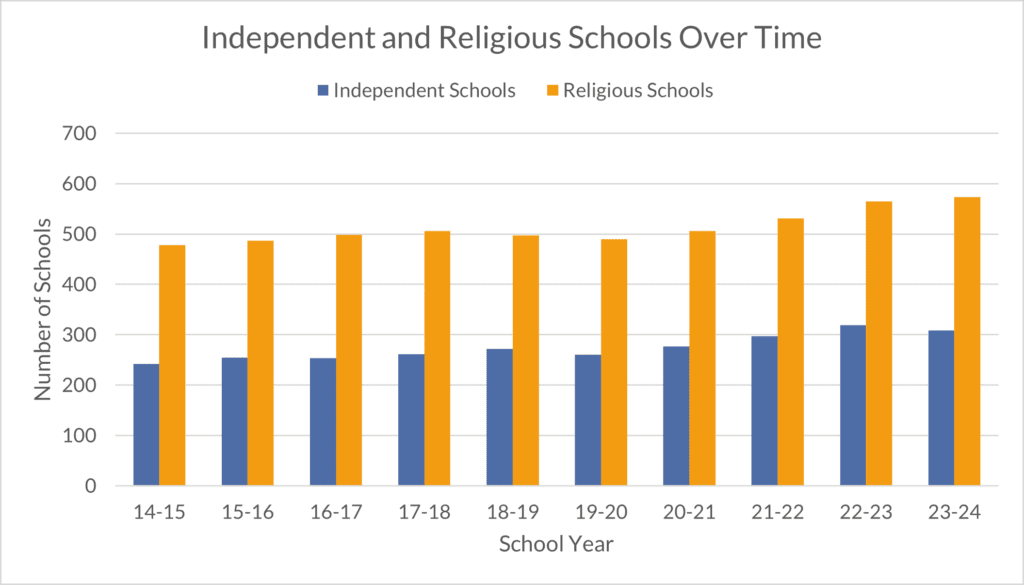
According to DNPE, 120 private schools did not report updated data for 2023-24, and 52 of the 881 schools will open this fall.
The Division of Non-Public Education (DNPE) used the new portal database system to generate the data in this report. To ensure accuracy, DNPE consistently reminded and encouraged schools to complete their Annual Report to update enrollment. Of the 881 schools, 52 of the schools will open in 2024-2025 school year. These schools were not required to complete the 23-24 Annual report. Of the 829 private schools who could have reported, 709 completed their annual reports leaving 120 who did not report updated data.
Note: While the governing statutes require schools to maintain attendance information, there is no statutory requirement to report the information using the DNPE portal. Accordingly, what follows is the best available information that estimates private school enrollment.
Excerpt from DNPE 2023-24 report
The number of private schools by county
The data in the report show private schools are not evenly distributed across North Carolina. In 11 counties, for example, there were zero private schools during the 2023-24 school year: Alleghany, Ashe, Camden, Caswell, Edgecombe, Graham, Jones, Martin, Perquimans, Tyrrell, and Washington.
In another four counties, there is only one private school: Gates, Greene, Hyde, and Warren.
In another 17 counties, there are two private schools: Alexander, Avery, Bertie, Bladen, Caldwell, Cherokee, Chowan, Clay, Jackson, Macon, Mitchell, Northampton, Pamlico, Person, Polk, Swain, and Wilkes.
By comparison, there are 96 private schools in Mecklenburg County and 91 private schools in Wake County.
A look at marketshare in 2023-24
Marketshare is a term used to described how many students are served by different sectors of schools, including traditional public, public charters, home schools, and private schools. The impact of school choice expansion on marketshare is being closely watched in North Carolina and around the country.
Public school enrollment increased slightly in North Carolina in 2023-24 — with charter school enrollment increasing by 4.9%, and traditional public school enrollment decreasing by 0.4%. Charter schools are public schools with more flexibility than traditional public schools.
There were 1,358,003 students enrolled in North Carolina traditional public schools at the start of the 2023-24 school year.
There were 139,985 charter school students in 2023-24.
The estimated student home school population was 179,900, up 3.2% from the year before.
Even with the reported increases in charter, private, and home school enrollment, traditional public schools remain the top choice for 75% of the state’s students and collectively traditional public schools and public charter schools serve 83% of students in the four sectors.
Why the number of private schools in rural counties may increase in the future
The 2023 budget provided for universal private school vouchers through the Opportunity Scholarship Program by removing all income eligibility requirements for recipients starting with the 2024-25 school year. The budget added $250 million to the Opportunity Scholarship Grant Reserve over the biennium, putting the revised appropriation for the reserve at $618 million through FY 2025.
The budget also eliminated the requirement that a student needs to have previously attended a public school.
After the Senate first proposed the program’s expansion, Democratic Gov. Roy Cooper declared a state of emergency for public education in North Carolina. In the months following, a bipartisan group of education stakeholders have also expressed concerns about the expansion.
Primary concerns include the lack of testing accountability at private schools, the impact of the expansion on funding and enrollment at public schools, and that private schools don’t have to serve all students.
With the expansion of vouchers, policymakers on both sides of the aisle have concerns about the disparity in the number of private schools across North Carolina’s counties. In other words, some families have much less opportunity to use a private school voucher, especially in rural counties.
In a Senate committee hearing in May, Sen. Natasha Marcus, D-Mecklenburg, asked, “is it really fair to the taxpayers in those counties whose kids don’t have a school to use them for to pay for families in other counties?”
Not all private schools are eligible to receive state dollars, and at the hearing, legislative staff noted that then 632 of the private schools in the state were eligible, and also that 10-15 counties did not have an eligible private school.
“Do you see that as fair,” Marcus continued at the hearing, “that the families in those counties are going to pay into a system that other families can use and they can’t. And regardless of their income, they have to pay their taxes and their own public school is their option and their only option, and yet they are paying for the wealthiest families to help pay their private school tuition bill?”
Sen. Michael Lee, R-New Hanover, responded: “I appreciate it that. The idea is, Sen. Marcus, you’re right. In those counties, children don’t have an alternative other than the school that they are relegated to by their zip code. By increasing the number of Opportunity Scholarships at all levels increases demand and hopefully creates markets in those counties that just don’t have any other options. I do think this particular program is like many programs. It’s going to help in the long run for those counties by developing and creating that market.”
Before the expansion of school choice, as of Jan. 23, 2024, 32,341 students had Opportunity Scholarships in North Carolina.
Following last year’s expansion, 71,956 applications for scholarships were received by the deadline on March 1.
The North Carolina State Education Assistance Authority (NCSEAA) has since extended the offer to 15,805 new students to receive an Opportunity Scholarship for the 2024-25 school year.
NCSEAA stands for North Carolina State Education Assistance Authority, and it is the state agency designated by law to administer K-12 scholarship programs, including Opportunity Scholarships.
That leaves about 55,000 students on a waitlist to receive Opportunity Scholarships. It is not clear how many of those students already attend private schools. All remaining waitlist students are in Tier 2, Tier 3, and Tier 4. (Tier 1 is for families with the lowest income levels.)
Last Wednesday, parents urged the General Assembly to pass House Bill 823, which would effectively clear the waitlist. The bill, which passed the Senate earlier this year, would provide $248 million nonrecurring for the upcoming school year and $215.5 million recurring to support scholarships in the 2025-26 school year.
The House and the Senate adjourned without passing a budget for this fiscal year. While both chambers agreed on further expanding the vouchers, they disagreed on giving additional raises to public school employees.
“The concern that members have had is that they want to make sure that if we’re talking about education, that we’re doing so comprehensively, that we’re also addressing the traditional schools as well,” House Speaker Tim Moore has said.
Cooper has said he is not against families choosing private school.
However, he has advocated against further expansion of the Opportunity Scholarship program until public schools are “fully funded” through the Leandro case.
“Let me be really clear, I’m not against private schools,” Cooper said in March. “But I am against taxpayer money going to private schools at the expense of public schools.”
Local and federal dollars do not follow students to private school.
Behind the Story
Reporter Ben Humphries conducted the data analysis and created the visualizations for this article.




